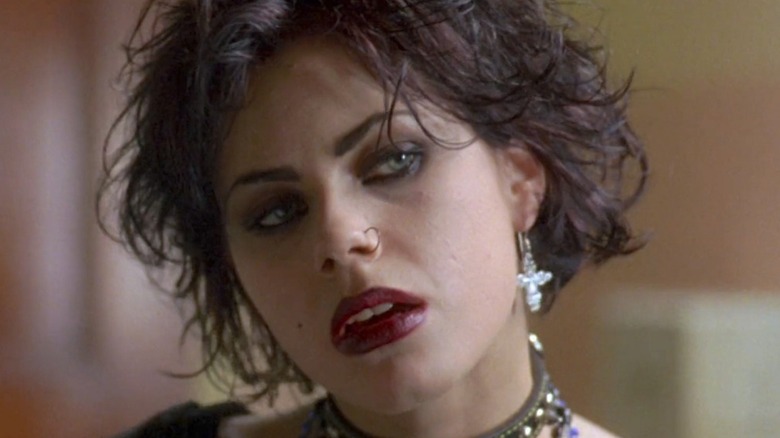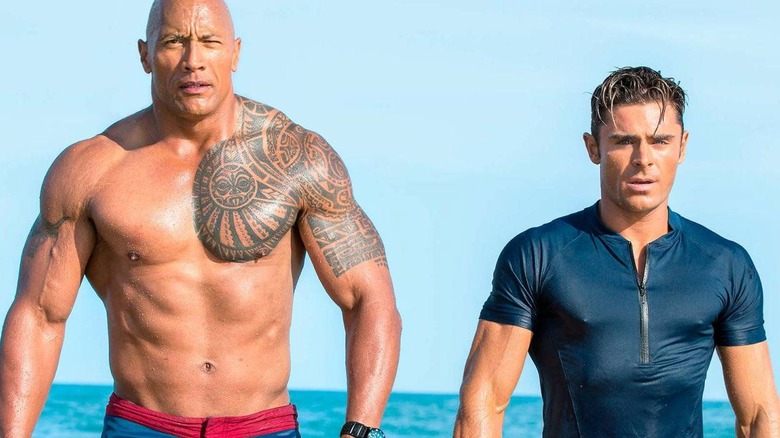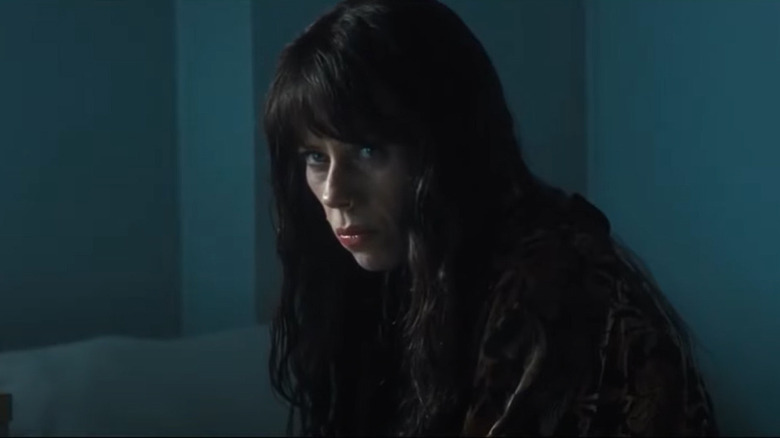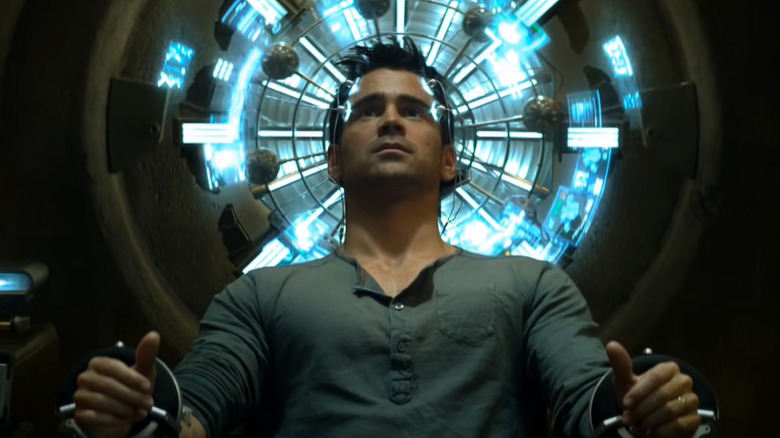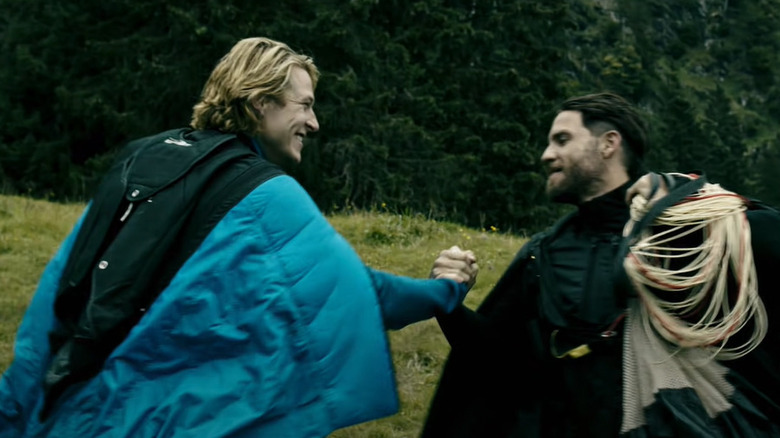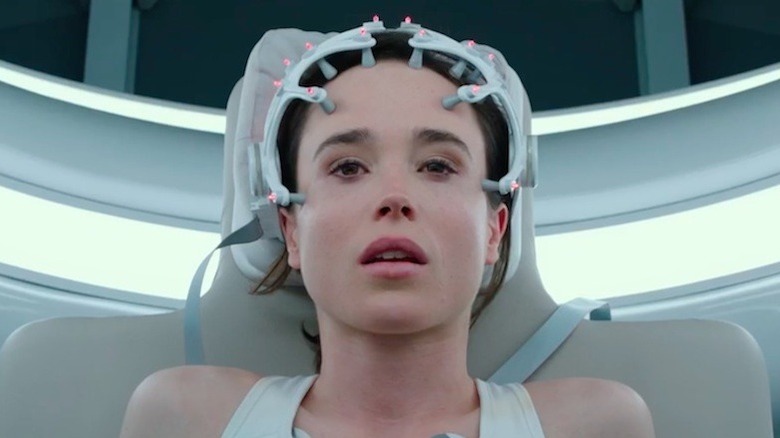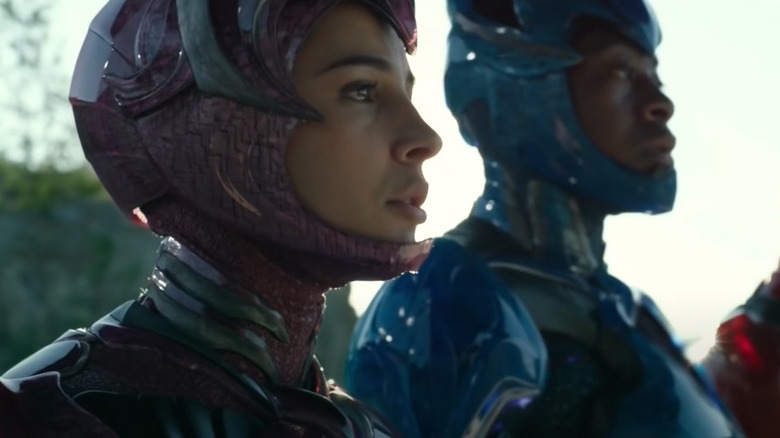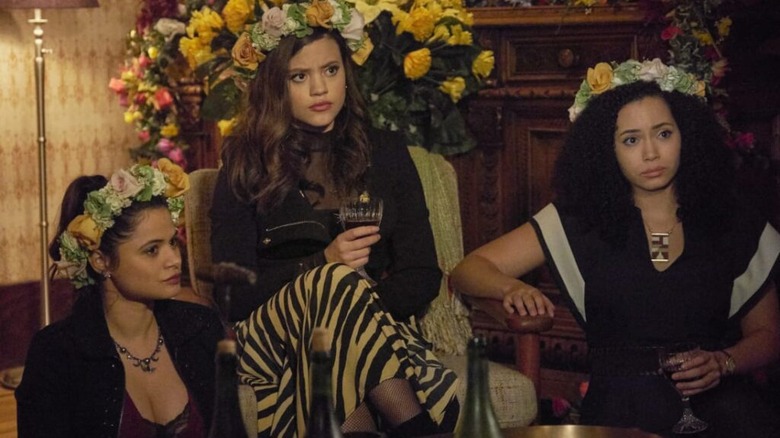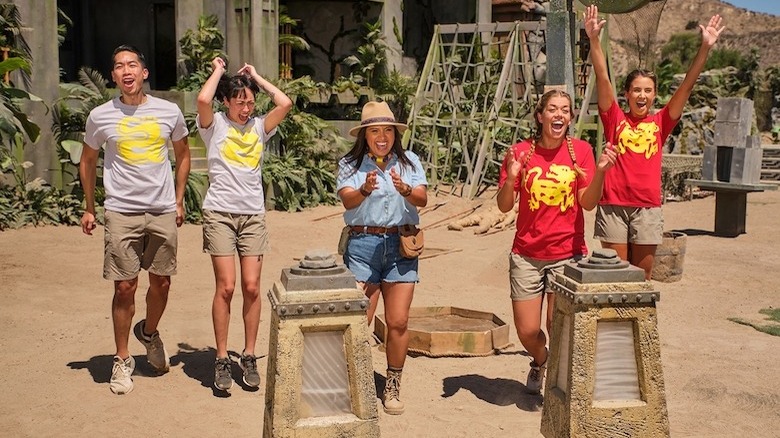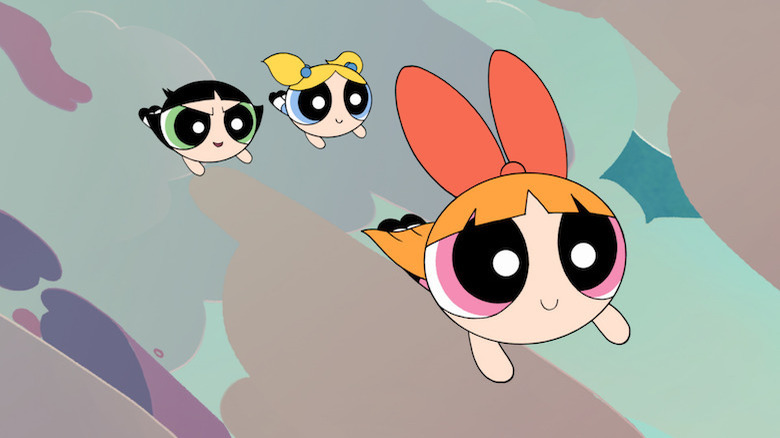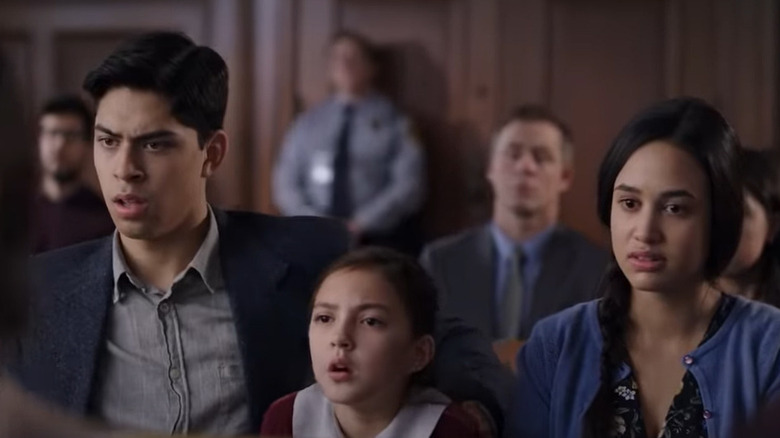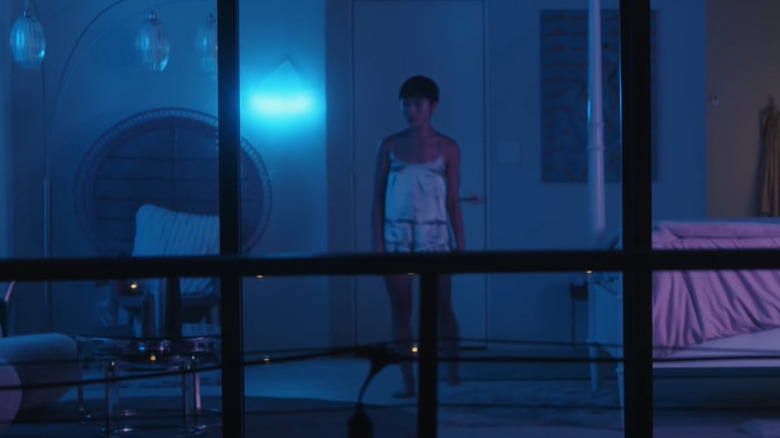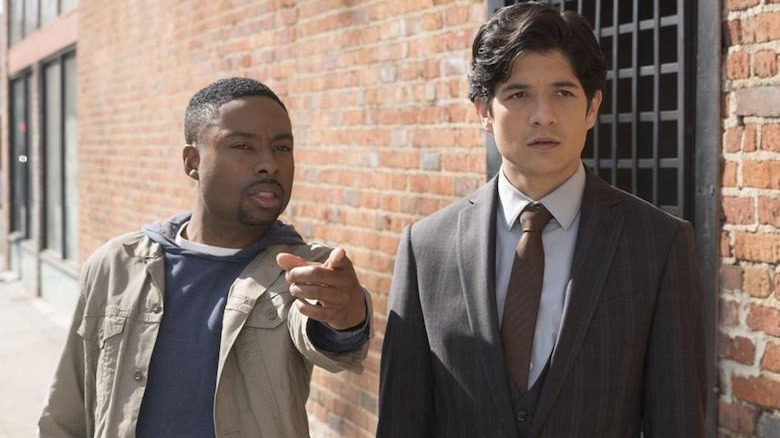Remakes Of 90s Movies And Shows That Were Totally Awful
The 1990s were a magical decade, defined by global revolution and social evolution that would eventually bring the world into the bold frontier of the 21st century. The end of the Cold War, marked by the fall of the Berlin Wall, is widely regarded as one of the most important events in history. The dawn of the internet changed human connection forever. The Hubble Space Telescope transformed our understanding of the cosmos. But none of that's important right now. What truly matters is the fact that the 1990s gave the world iconic pop culture staples like "Barney and Friends," "Seinfeld," "The X-Files," the Spice Girls, and countless other properties we still adore today.
Thanks to Hollywood's fondness for remakes and nostalgia, recent years have seen a deluge of remakes of 1990s staples. Some have been successful, like Disney's recent spate of live-action remakes of their animated classics. Others, however, have come to be regarded as nothing more than shameless cash grabs that cynically take advantage of viewers' memories. We're here to take a look at some of the worst 1990s remakes ever made. Many of these disasters may have had good intentions, but none of them managed to live up to their originals, much less leave a notable impression on their own meager merits.
Baywatch
"Baywatch" follows the adventures of a gang of SoCal lifeguards played by beautiful stars like Pamela Anderson, Jaason Simmons, and Yasmine Bleeth, among others. The series lead, Mitch Buchannon, is played by David Hasselhoff, who does a solid job. But it's no secret that the show's appeal is in watching gorgeous people run around on sun-soaked beaches. This approach paid off: "Baywatch" was a massive international success (via The Baltimore Sun) that ultimately ran for 242 episodes over 11 seasons.
In 2017, "Baywatch" was re-envisioned as a big-budget R-rated comedy starring Dwayne "The Rock" Johnson and Zac Efron. This "Baywatch" is a pale cash-in on the lingering success of the original show. It's also a blatant attempt to replicate the formula (via The Guardian) of the modern-day "21 Jump Street" films, which adapt their own TV source material into wacky comedies. However, while the original "21 Jump Street" is a straight-faced cop drama, the classic "Baywatch" is already silly and campy, so there's nothing really subversive about this big screen remake.
The new "Baywatch" has almost nothing to do with the original show, save for a few thrown-in character names and meaningless cameos from David Hasselhoff and Pamela Anderson. It's basically its own mediocre entity with some superficial "Baywatch" trappings glued on in an attempt to trick old-school fans. The end result was a very modest box office performance that wasn't enough to spawn a sequel. The franchise has been dead in the water ever since.
The Craft: Legacy
One of the most seminal coming-of-age films of the 1990s, "The Craft" follows a quartet of teenage witches as they test the limits of their burgeoning powers. The film is fondly remembered for its use of supernatural elements as a metaphor for adolescence, its killer aesthetic, and a number of very memorable lines. To this day, Fairuza Balk's Nancy Downs is considered one of the most important characters in the 1990s pop culture pantheon.
A sequel, "The Craft: Legacy," was quietly released in October 2020. This Blumhouse Productions film acts as a soft reboot of the franchise, ostensibly remaking the original while subtly serving as a sequel to its events. This culminates in a seconds-long cameo from Fairuza Balk ... and that's about it. While "The Craft: Legacy" brings some new ideas to the table (mainly in the form of a rare villainous turn from David Duchovny), its core foursome of young witches were always doomed to remain in the shadow of their original counterparts. Ultimately, there's just no reason to watch "The Craft: Legacy" over the 1996 original, which remains as timeless as ever.
Total Recall
1990's "Total Recall" is well remembered as a delightfully campy science fiction-action epic. Director Paul Verhoeven's reality-bending approach is electric, Arnold Schwarzenegger's lead performance is regarded as one of his best outings, and the film's production values are still incredible to look at today.
The 2012 remake, directed by Len Wiseman, is a decent movie with a number of great action sequences. Sadly, this "Total Recall" completely removes all the dreamlike whimsy and eclectic charm that so distinguishes the original. Colin Farrell, normally a fantastic actor, has all the charisma of a video game character in the lead role. Gone are the mutants, the gore, and the cheesy one-liners, replaced by monochrome green screen landscapes and PG-13 sensibilities. At least Kate Beckinsale is having fun as the psychotic wife-assassin character played by Sharon Stone in the original.
A director's cut released on home video adds more than 10 minutes to the movie and restores some of the dreamy ambiguity of the original film. Sadly, it's not enough to elevate this remake into anything more than a minor footnote within the legacy of the 1990 classic.
Point Break
In 1991's "Point Break," directed by Kathryn Bigelow, Keanu Reeves plays an undercover cop who infiltrates a gang of adrenaline junkie bank robbers, led by Patrick Swayze. The film is fondly remembered by critics and audiences, with much praise directed towards the film's outstanding action sequences and charismatic lead performances. As the years have marched on, the movie's cult status has only grown, which led to a 2015 remake directed by Ericson Core.
2015's "Point Break" trades Kathryn Bigelow's insightful observations on masculinity for joyless brooding. What's more, it manages to rob the action of any excitement or sense of genuine adrenaline. The original might be dour, but it's imbued with a sense of meditative purpose severely lacking in the remake. Furthermore, though Luke Bracey and Edgar Ramirez are certainly handsome men, they can't match the testosterone-fueled magnetism of Reeves and Swayze. While extreme sports enthusiasts might get a kick out of the remake's most high-octane sequences, they're certainly not enough to justify the film's sorry existence.
Flatliners
A high-concept thriller about near-death experiences, 1990's "Flatliners" follows a group of medical students who experiment with death and the afterlife by stopping and restarting their hearts and documenting what they see. Things take a dark turn when they start witnessing visions of what may be ghosts from "the other side," or manifestations of their own long-hidden secrets.
Directed by '90s icon Joel Schumacher, "Flatliners" has a tremendous visual style that overcomes its uneven storytelling. Even decades later, the movie still looks amazing and wholly unique. In fact, it's a whole heck of a lot more visually entrancing than its own remake, 2017's "Flatliners," directed by Niels Arden Oplev.
This remake has some merits, like Elliot Page's strong performance and an appearance from Kiefer Sutherland. But it still amounts to little more than an unnecessary retread, grievously lacking Schumacher's signature flair. Oddly, it's lightly implied (via Collider) that Sutherland is playing the same character as he did in the original. Alas, this connection adds nothing to the plot of either film.
Power Rangers
Children of the 1990s grew up watching "Mighty Morphin Power Rangers," a martial arts show about "teenagers with attitude" who take on the forces of evil with the help of Zordon and Alpha 5. The show, made by shooting new scenes that were mixed in with footage of the original Japanese action series (via Complex), was a ratings hit and a bona fide cultural phenomenon. It spawned numerous movies, video games, and new shows, which continue to air to this day. It might not be as culturally relevant as it was in its early 1990s heyday, but the Power Rangers are still very much with us.
Director Dean Israelite was tasked with rebooting the franchise with a big-budget feature film. "Power Rangers," released in 2017, shares no continuity with the original television series, completely reimagining the five Rangers and their nemesis, Rita Repulsa (played by a delightfully hammy Elizabeth Banks). Alas, the film tries way too hard to be "mature," with more time invested in the kids' personal lives, rather than their super-powered destinies. While it's not outright bad, it feels more like "The Breakfast Club" with a sci-fi twist than a proper adaptation of "Power Rangers."
The film failed to make a dent at the box office, and plans for a franchise were scrapped.
Charmed
Over the course of 179 episodes across eight seasons, "Charmed" follows three young witch sisters played by Shannen Doherty, Alyssa Milano, and Holly Marie Combs as they protect the world from those who would do it harm. This brave trio uses the "Power of Three" to overcome any supernatural challenge, no matter how daunting. Doherty left the show after Season 3, at which point Rose McGowan was brought in as long-lost half-sister Paige. Fans adored the show's unique focus, intriguing world-building, and juicy character arcs.
In 2018, 12 years after the original series ended, a reboot began airing on The CW network. This new "Charmed" was met with a mix of praise and scorn, with some appreciating the socially relevant storytelling, while others decried the show for casting non-Latina actors as two of the three lead Latina characters. Meanwhile, actors from the original "Charmed" lamented the fact that they were not asked to participate in the new series. Holly Marie Combs particularly criticized the hypocrisy of a "feminist" show refusing to include the original actors, presumably because they're "too old to do a job they did 12 years ago."
While the new "Charmed" earned decent reviews, diehard fans and much of the original talent remained disappointed, and the series ended with its fourth season. If only the Power of Three could fix remakes.
Legends of the Hidden Temple
One of the more popular post-"Double Dare" Nickelodeon game shows, "Legends of the Hidden Temple" is still notable for its impressive production design and unique structure. This action-packed show placed contestants in a series of trivia-based and physical challenges set within an ancient Mayan temple, guarded by the giant stone statue, Olmec. Voiced by Dee Bradley Baker, Olmec's giant size and glowing red eyes may have inadvertently scared off some of the show's target audience, but he nonetheless became an instantly iconic figure for Nickelodeon.
"Legends of the Hidden Temple" returned in the form of a 2016 TV movie that adapts the game show format into a family-friendly adventure flick. The original host of the show, Kirk Fogg, appears in the movie, while Baker reprises the role of Olmec. Even more recently, "Legends of the Hidden Temple" came back as a 2021 game show on The CW. Inexplicably, the new series features adult contestants playing through the same old challenges from the original show. While Olmec looks more realistic than ever (and is still voiced by Baker), he can't obscure the fact that bringing grown-ups into the mix just feels silly, and does little to validate its hour-long runtime. Since the entire original series can be streamed on Paramount+, there's little reason to watch the new series. At least the TV movie is different enough to justify its existence.
The Powerpuff Girls
"The Powerpuff Girls," created by Craig McCracken, quickly became a cartoon classic. The show remains incredibly popular among boys, girls, and even adults for its clever humor and subversively (and adorably) violent superhero action. The show spawned a 2002 theatrical film and a 10th-anniversary special, entitled "The Powerpuff Girls Rule!!!"
Without the input of the original talent, however, a 2016 reboot of "The Powerpuff Girls" failed to impress old-school fans. This version of the beloved cartoon is geared more towards younger children, and makes no attempt to challenge the preconceptions of its audience. Where the original Powerpuff Girls are a subversive trio (via Polygon) whose adventures appeal to all demographics, critics found the reboot to be largely empty entertainment that pays little more than lip service to the original series' transgressive feminism (via The AV Club). To add insult to injury, the original Powerpuff Girls actors were not asked to reprise their roles for the new show.
"The Powerpuff Girls" reboot quietly ended its run after three seasons. In the future, when teens and adults introduce their younger family members to "The Powerpuff Girls," it's a fair bet they'll be talking about the original series, not the reboot.
Party of Five
An early hit for the Fox network, "Party of Five" follows a family of siblings who must fend for themselves after their parents are killed by a drunk driver. Like all the best teen-focused shows, "Party of Five" succeeds by meeting its audience at their level, never talking down to them, and being intelligent and empathetic. The show lasted for six seasons, and helped launch the careers of stars like Matthew Fox, Jennifer Love Hewitt, Neve Campbell, and Adam Scott, among many others.
In 2020, a reboot of "Party of Five" debuted on the Freeform network. The new show follows the Acosta children, whose parents are deported to Mexico. Now, the kids must try and get by on their own in a country that has betrayed them. This rendition comes from the same duo, Amy Lippman and Christopher Keyser, that created the original, though there is no shared continuity between the two. Despite earning dazzling reviews, 2020's "Party of Five" failed to attract an audience, and was canceled after only 10 episodes.
Perhaps if Freeform had been willing to give the show more of a chance, it could have grown an audience and become the next "This Is Us." Alas, it never got the fair shake it deserved, and "Party of Five" has already been forgotten by all but the most devoted fans.
I Know What You Did Last Summer
After reviving the slasher genre with "Scream," writer Kevin Williamson's next project was 1997's "I Know What You Did Last Summer," starring Sarah Michelle Gellar, Jennifer Love Hewitt, Freddie Prinze Jr., and Ryan Phillippe. The movie follows a group of friends who accidentally killed a man and covered up their crime; one year later, they are mysteriously hunted down, one by one. Like "Scream" before it, "I Know What You Did Last Summer" bolsters its slasher sensibilities with a compelling murder-mystery angle. The hook worked (pun intended), leading to box office success and a sequel one year later. There was also a straight-to-video 2006 sequel, "I'll Always Know What You Did Last Summer," but the less said about that, the better.
More recently, 2021 saw the debut of a television adaptation of "I Know What You Did Last Summer" on Amazon Prime. This new production stretches the murder mystery out into an eight-episode miniseries. Unfortunately, spreading out the kills over such a long runtime means audiences are forced to try to empathize with boring characters. This uninspired group of young adults is so unlikable, viewers are most likely to root for the killer. At least the death sequences are fairly entertaining, especially the one with the blue frozen drink mix. What a painful, but delicious, way to die.
Rush Hour
The Jackie Chan and Chris Tucker-led "Rush Hour" trilogy is a delightful odyssey of crass comedy, amazing action sequences, and natural chemistry between its two leads. While the third entry is considered a lesser film when compared to its two predecessors, all three were successful at the box office.
On the other hand, the 2016 television adaptation of "Rush Hour" failed to impress fans or critics. Jon Foo is a talented actor (see him shine in 2019's "The Outsider"), but he is bland and joyless as Detective Lee, and the show's action scenes fail to take advantage of his real-life martial arts skills. Meanwhile, Justin Hires struggles to reach a fraction of Chris Tucker's greatness as this version of Detective Carter. If this series accomplishes anything, it's proving that the chemistry between Tucker and Chan is lightning in a bottle that can't be easily replicated.
"Rush Hour" could have been a full-fledged action movie every week, like the little-remembered Sammo Hung/Arsenio Hall series, "Martial Law," which ran for two seasons on CBS in the late 1990s. Instead, this series tries to emulate other procedural cop shows, with mediocre fight scenes thrown in. Those looking for martial arts-themed television shows would be better served by watching "Into the Badlands," "Kung Fu," "Warrior," or "Wu Assassins." Heck, even Season 1 of "Iron Fist" has better action! The "Rush Hour" films are reliable fun, but this TV version is totally awful.
